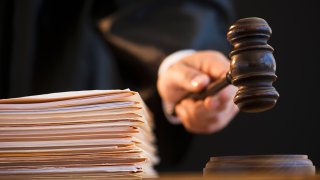
A Connecticut man imprisoned for the past 28 years for a New Haven shooting that killed a baby and paralyzed her grandmother has been granted a new trial by a judge, who said prosecutors withheld evidence from the defense and city police failed to pursue other suspects — including one who recanted a confession.
Judge Jon Alander ordered the new trial for Adam Carmon on Wednesday. Alander also ruled, however, that Carmon did not prove his claim that he was actually innocent.
Carmon, now 50, was convicted of murder and other crimes and sentenced to 85 years in prison for the 1994 shooting that killed 7-month-old Danielle Taft and paralyzed her grandmother, Charlene Troutman, in an apartment. A gunman outside the building fired more than a dozen shots into an apartment window.
The case drew statewide attention to the problem of urban gun violence and was mentioned by former Gov. Lowell P. Weicker Jr. during an address to the state legislature.
Get top local stories in Connecticut delivered to you every morning. Sign up for NBC Connecticut's News Headlines newsletter.
Alander wrote in a 51-page ruling that there were numerous problems with the case against Carmon. He said the evidence withheld from the defense, as well as new evidence that emerged, cast doubt on Carmon’s convictions.
“How could anyone have confidence in a verdict of guilty in a case such as this?” Alander wrote. “The suppressed evidence and the new forensic evidence places the entire case against the petitioner [Carmon] in such a different light as to undermine confidence in the verdict that the jury reached.”
Carmon’s lawyers, Doug Lieb and David Keenan, said they will seek his release from prison as soon as possible as the case heads back to the trial court.
“More than 27 years ago, our client Adam Carmon was wrongly convicted for shooting to death...Danielle Taft and wounding her grandmother [Charlene] Troutman,” Lieb and Keenan said in a statement. “Because of his perseverance, the Connecticut judicial system has now finally recognized that injustice.”
New Haven State’s Attorney John Doyle said in a brief statement that his office is reviewing Alander’s decision to determine the next legal steps.
Some evidence withheld from the defense showed two other men — purported drug dealers — could have been involved in the shooting, the judge said. Prosecutors failed to disclose to Carmon’s lawyer that one of those men voluntarily went to the police station and implicated himself and another man in the shooting.
The man told police that he was involved in a fight with Troutman’s son and his friends over a drug debt outside the apartment earlier on the day of the shooting and wanted revenge, the judge’s decision said.
But police abandoned their investigation of the two other men when a firearms expert concluded a handgun that had been possessed by Carmon was the murder weapon. That conclusion would later turn out to be wrong based on new evidence, Alander said.
And the man who went to police and implicated himself later recanted his confession, encouraged to do so by police investigators because his statements “did not fit their new found conclusion that the petitioner [Carmon] was the shooter,” the judge wrote.
There were also problems with the identification of Carmon as the shooter by witnesses, Alander said. The jury was not told that a key witness looking at photos provided by police identified another man as the shooter, the judge said. And that witness later identified Carmon as the shooter at a “patently suggestive and highly biased” court hearing, he said.
“Our criminal justice system depends on police and prosecutors to act ethically and honestly,” Carmon’s lawyers said. “Unfortunately, that did not happen in this case, and both Mr. Carmon and the Taft family have been made to suffer the consequences.”
Shirley Troutman, Danielle’s mother and Charlene Troutman’s daughter, did not immediately respond to a message seeking comment. She said in a Facebook post Thursday that she was “at a loss for words” about the new trial decision and did not want to relive the trauma of the shooting and another trial.



